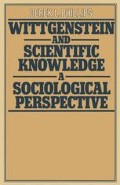Abstract
One of the consequences of the new image of science has been an emphasis on the ‘incommensurability’ of paradigms. As we have seen, advocates of the new image challenge the view that statements, including scientific theories, have some atomic, fixed meanings; they argue that statements have meanings only by virtue of their relations to other statements in the system to which they belong. Further, Kuhn and Feyerabend stress the very impossibility of comparing, contrasting and discussing different observational languages, theories and standards when different scientific paradigms are involved. Scientists work within these paradigms, and the paradigms determine the scientists’ views of the world. A scientist working within a given paradigm simply cannot, on Kuhn’s account, transcend his own particular situation. In his words: ‘Though most of the same signs are used before and after a [scientific] revolution e.g. force, mass, element, compound, cell the ways in which some of them attach to nature have changed. Successive theories are thus, we say, incommensurable.’1 Feyerabend is in general agreement with Kuhn, acknowledging that ‘succeeding paradigms can be evaluated only with difficulty and that they may be altogether incomparable’.2 He goes on to speak of incommensurable theories whose ‘content cannot be compared’.
Preview
Unable to display preview. Download preview PDF.
Notes
Thomas S. Kuhn, The Structure of Scientific Revolutions, second edition (Chicago: University of Chicago Press, 1970) p. 267.
Paul K. Feyerabend, ‘Consolations for the Specialist’, in Imre Lakatos and Alan Musgrave (eds), Criticism and the Growth of Knowledge (Cambridge: Cambridge University Press, 1970) p. 219.
Thomas S. Kuhn, The Structure of Scientific Revolutions (Chicago: University of Chicago Press, 1962) p. 10.
Derek L. Phillips, Abandoning Method (San Francisco and London: Jossey-Bass, 1973).
Michael Dummett, ‘Wittgenstein’s Philosophy of Mathematics’, The Philosophical Review 68 (1959) p. 331.
C. Wright Mills, Power, Politics, and People (ed. Irving Louis Horowitz) (New York: Ballantine Books, 1963) p. 460.
Norwood Russell Hanson, Patterns of Discovery (Cambridge: Cambridge University Press, 1958) p. 5.
Jerome S. Bruner and A. L. Minturn, ‘Perceptual Identification and Perceptual Organization’, Journal of General Psychology 53 (1955) pp. 21–8.
Jerome S. Bruner and Cecile C. Goodman, ‘Value and Need as Organizing Factors in Perception’, Journal of Abnormal and Social Psychology 42 (1947) pp. 33–44. See also Jerome S. Bruner, Beyond the Information Given (New York: Norton, 1973).
See, for example, Bruner (1973), op. cit.; U. Neisser, Cognitive Psychology (New York: Appleton-Century-Crofts, 1967)
Jean Piaget, On the Development of Memory and Identity, Heinz Warner Lecture Series, vol. 2 (Worcester, Mass.: Clark University Press, 1967).
Stephen Toulmin, Human Understanding, vol. 1 (Oxford: Oxford University Press, 1972) p. 103.
Karl Mannheim, Ideology and Utopia (London: Routledge & Kegan Paul, 1972) p. 263.
C. Wright Mills, Power, Politics and People (ed. Irving Louis Horowitz) (New York: Ballantine Books, 1963).
Gottlob Frege, The Foundations of Arithmetic (trans. J. L. Austin), second edition (Oxford: Basil Blackwell, 1953) p, vii.
G. H. Hardy, A Mathematician’s Apology (Cambridge: Cambridge University Press, 1941) pp. 63–4.
Morris Cohen, Reason and Nature (Glencoe, Ill.: Free Press, 1953) p. 193.
Alfred Schutz, ‘Subjective and Objective Meaning’, in Anthony Giddens (ed.), Positivism and Sociology (London: Heinemann Educational Books, 1974) pp. 42–3.
Gerard De Gré, ‘The Sociology of Knowledge and the Problem of Truth’, in James E. Curtis and John W. Petras (eds), The Sociology of Knowledge (New York: Praeger, 1970) pp. 664–5.
Ian D. Currie, ‘The Sapir-Whorf Hypothesis’, ibid., pp. 403–21; Stephen Toulmin, The Uses of Argument (Cambridge: Cambridge University Press, 1958).
Stephen Toulmin, Human Understanding, vol. 1 (Oxford: Oxford University Press, 1972) pp. 251–2.
Marcel Granet, La Pensée Chinoise (Paris: La Renaissance du Livre, 1934).
David Bloor, ‘Wittgenstein and Mannheim on the Sociology of Mathematics’, Studies in History and Philosophy of Science 2 (1973) pp. 173–91. I draw heavily on this excellent paper throughout the chapter.
O. Neugebauer, The Exact Sciences in Antiquity (Princeton, N.J.: Princeton University Press, 1952).
Peter Winch, The Idea of a Social Science (New York: Humanities Press, 1958) p. 43.
Author information
Authors and Affiliations
Copyright information
© 1977 Derek L. Phillips
About this chapter
Cite this chapter
Phillips, D.L. (1977). Paradigms and Incommensurability. In: Wittgenstein and Scientific Knowledge. Palgrave, London. https://doi.org/10.1007/978-1-349-03160-3_5
Download citation
DOI: https://doi.org/10.1007/978-1-349-03160-3_5
Publisher Name: Palgrave, London
Print ISBN: 978-1-349-03162-7
Online ISBN: 978-1-349-03160-3
eBook Packages: Palgrave Religion & Philosophy CollectionPhilosophy and Religion (R0)

